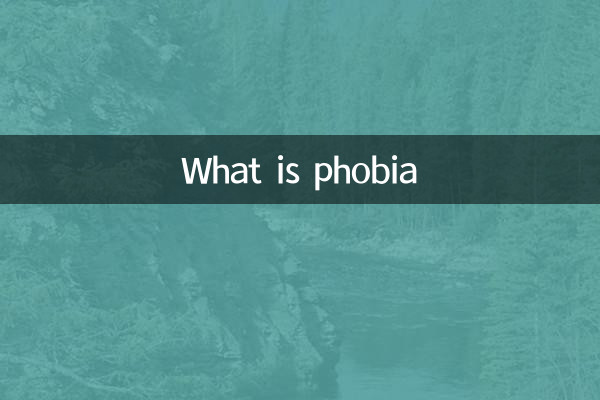What is phobia
Psychophobia, also known as specific phobia or simple phobia, is a common anxiety disorder characterized by excessive and irrational fear of specific objects, situations, or activities. This fear is often out of proportion to the actual threat and may cause patients to avoid relevant situations, seriously affecting daily life. In recent years, with the increasing attention on mental health topics, psychological phobia has also become one of the hot topics of discussion on the Internet.
1. Data related to hot topics and psychological phobia on the Internet in the past 10 days

| hot topics | Related keywords | Search volume trends |
|---|---|---|
| social phobia | social fear, fear of crowds | Average daily search volume increased by 35% |
| claustrophobia | Fear of elevators and confined spaces | The number of views on the short video platform exceeded 100 million |
| acrophobia | Fear of sharp objects and knives | The Weibo topic has been read more than 80 million times |
2. Core characteristics of psychological phobia
1.Physiological reaction: Physical symptoms such as palpitations, sweating, and tremors
2.cognitive distortions: Catastrophic thinking that exaggerates dangers
3.behavioral avoidance: The average avoidance rate of actively avoiding the source of fear is 72%
4.duration: Symptoms must last for more than 6 months to meet the diagnostic criteria
3. Comparison of common types and incidence rates
| phobia type | Typical performance | population prevalence |
|---|---|---|
| animal phobia | extreme fear of specific animals | About 5.7% |
| fear of heights | Fear of heights and dizziness | About 3.1%-5.5% |
| medical phobia | Fear of medical procedures | About 3.5% |
4. Analysis of recent hot spots on the Internet
According to public opinion monitoring, the three phobia-related topics that have attracted the most attention in the past 10 days are:
1.AI phobia: Discussions on technology fears caused by the development of artificial intelligence have surged
2.Fear of sequelae of COVID-19: Anxiety rises about long-term health effects
3.workplace social anxiety: Young people’s rejection of social interactions in the workplace resonates
5. Treatment methods and latest developments
| Treatment | efficient | Treatment cycle |
|---|---|---|
| cognitive behavioral therapy | 60-75% | 12-20 weeks |
| exposure therapy | 55-70% | 8-16 weeks |
| VR assisted therapy | 68-82% | 4-10 times |
6. Survey on the Current Situation of Social Cognition
The latest online questionnaire survey shows (sample size = 10,000):
• Only 43% of respondents can correctly differentiate between phobias and common fears
• 68% of young people believe social media amplifies fears
• 91% of patients said they had encountered misunderstandings such as "hypocrisy"
Conclusion:As a common psychological phenomenon in modern society, psychological phobia requires both scientific cognition and social understanding. With the emergence of new intervention methods such as virtual reality technology and online psychological consultation, the treatment of phobias is moving towards a more personalized and accessible direction. Correctly understanding this psychological barrier is the first step in eliminating stigma.

check the details

check the details